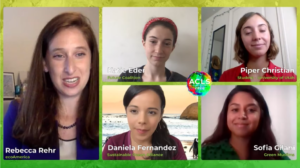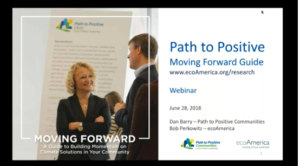Climate Voters: What’s Next
Like many people in America, I woke up today to the reality that we do not have a decisive presidential outcome from yesterday’s election. This was not unexpected; many predicted this, and many messages in social and other media revolved around the need to be patient in this election. There has been so much back and forth in challenges during early voting that we as a nation are prepared to wait, and to let the process work.
No one is able to predict the exact outcome of yesterday’s election, yet. But there are some truths that are evident even now, and from my perspective as a climate advocate in a swing state, here are some learnings that can shape our climate action going forward.
>Youth really showed up in this election, and were determined to have their voices heard even in places where officials made it harder for them – like moving polling sites away from college campuses. This is good news for climate advocacy, because young people will be the most impacted by the growing climate crisis, and can be strong voices for change, as we saw in the youth session of our American Climate Leadership Summit.

>Today the US officially withdraws from the Paris Accord. However, we know that the Paris targets are not actually ambitious enough to maintain the healthy planet and environment that will allow future generations to thrive. We will need to advocate for even stronger progress and stricter targets for GHG reduction.
>We know that no matter how the national election turns out, we have to work harder at the local and state levels to bring real change in the way we run our cities and our farms. We have showcased leaders who are doing just that at the local level in our Let’s Talk Climate series. In our country, local and state governments have a great deal of authority in everything from charging polluters to providing incentives for clean energy and innovation, and all of us can continue to work with our state legislatures to let them know we care about these solutions.
>The pandemic is still with us. COVID-19 continues to draw our attention to the need for a robust healthcare system, and we know that health concerns are also a great motivator for all of us to find solutions to counter the growing threats of climate change. We can support our researchers, our doctors and nurses, and our healthcare institutions, and help reinforce trust in science and medical professionals, as was discussed in Successful Public Health Campaigns: How to Win on Climate.

>Local action continues to be important. Support for local food, gardens and farms; support for local products that avoid the need for long distance trucking emissions; and support for local clean energy, energy efficiency, and transportation infrastructure still need our vocal advocacy. We have a long list of actions that local voices can support on our Path to Positive Communities Toolkit.
>There is much work to be done to heal our divisions. No matter who wins the White House or the State House, we need to do some soul searching about what it means for each of us to be a good neighbor. We have exposed some of the racial and environmental injustice that has marred our country from the start; we have exposed the links to disparities in health and economic mobility that stem from this injustice; and we see the anger that grows from those who feel forgotten in this changing economy – on both sides of the political aisle. Each of us can advocate for a just transition, recognizing climate injustice, since rapid changes in our energy infrastructure and urban growth will leave some occupations behind. We can all advocate for better re-training and support more nimble educational structures that can reach those most impacted – including more widespread access to affordable broadband.
All of these will be true no matter what happens in Washington, though some will get more federal support than others depending on how it all shakes out. As supporters of climate action, we know that our advocacy will continue to be needed, our best practices will need to be shared, and we will have to find ways to work together to get more Americans on board. And if we do end up with a federal government that realizes climate action is urgently needed, we will be better poised to help accelerate that work in every corner of America.
